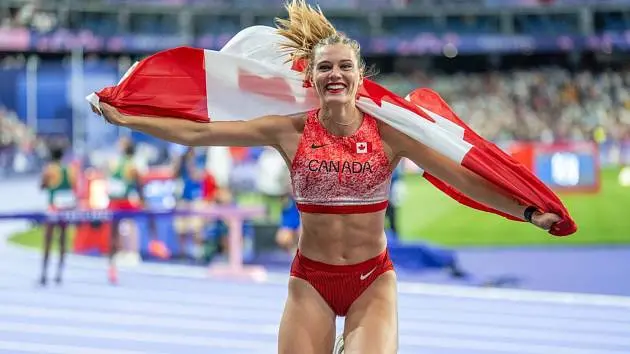Canada’s pole vaulter Alysha Newman won a bronze medal at the Paris Olympics. She celebrated her record-breaking jump (4.85 metres, breaking the national record) with a mischievous twerk. Was it a display of unrelieved joy by a 30-year-old athlete who has struggled in recent years? Or was it a thoughtful gesture?
Almost immediately after the footage of her bronze dance went around the world, her profile on the well-known paid content website OnlyFans recorded over twenty thousand new contributors. That meant over $150,000 (three and a half million crowns) in Newman’s coffers. And the numbers and profits have continued to grow ever since.
“Of course, knowing that I was able to raise enough money on my own by appearing on OnlyFans and thanks to sponsors helped me a lot to win the medal,” said Newman, who has faced criticism before for posing on the site, which is known for its sometimes quite explicitly erotic content.
The Canadian is not above gossip and ridicule. On the contrary, she promised before the Olympic final that if she succeeded, her fans would see a “hot photo with a medal”. Later, however, she preferred to clarify that rather than nudity, she shares tips on proper training or nutrition with paying customers and reveals the behind-the-scenes of professional athletics.
The body is a great commodity
Newman certainly doesn’t regret her decision to go on OnlyFans, although her mother, for example, reportedly objected for a long time. The Canadian pole vaulter is now making big money, buying real estate and investing in cryptocurrencies. However, she is far from the only one among the Olympic participants who has decided to improve her budget in this way.
“An athlete’s body is an amazing commodity, and people are willing to pay to see them,” Australian Matthew Mitcham, a gold medalist in the diving at the 2008 Beijing Games, told the AP. The first-ever Olympic gold medalist to openly declare he is gay, he says posing for photos has given him financial stability.
Mitcham and other “cross-dressing” sportsmen and women usually insist on avoiding pornography and offering more subtle, sometimes artistic, eroticism. However, as German diver Timo Barthel, who also makes a living by publishing photos of his chiseled physique, says: “In sports, we wear nothing but a swimsuit, which is very close to nudity.”
Modern slavery?
It makes sense. Athletes work hours a day for years to look the way they do. So why not rip on that? The problem is, it’s usually a necessity. Many Olympians, even from Western countries, have criticized the crumbling system of funding sports. The big stars may make millions, but that is not true of the vast majority of others – including medal winners.
“The vast majority of athletes are slowly running out of rent, while the International Olympic Committee and national committees are drowning in money and have a lot of well-paid staff. They all make money through the athletes. It’s almost like modern slavery,” said Rob Koehler, director of Global Athlete.
The IOC says that ninety per cent of the profits go to the development of the sport, but not a few Olympians complain that they have to pay for part – or even all – of their own training. This includes the costs of medical care, coaches, physiotherapy, travel, accommodation and so on.
“I never liked the fact that athletes don’t make much money. That’s why I discovered the entrepreneurial skills in me,” commented Newman, a graduate student in physiology and nutrition at the University of Miami. She certainly doesn’t regret her Parisian twerking.

